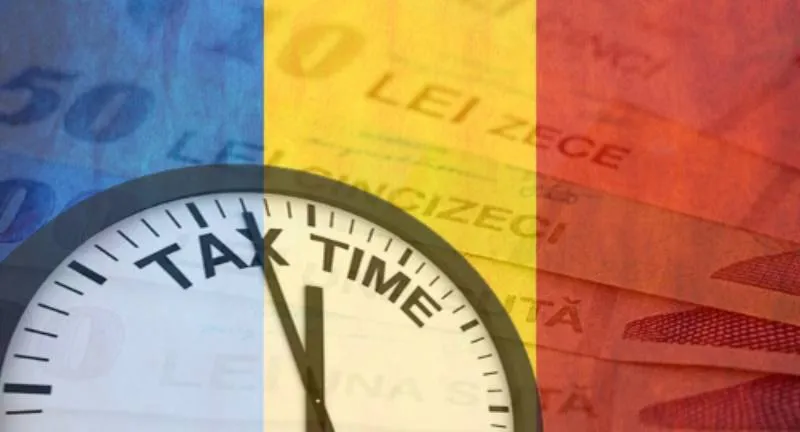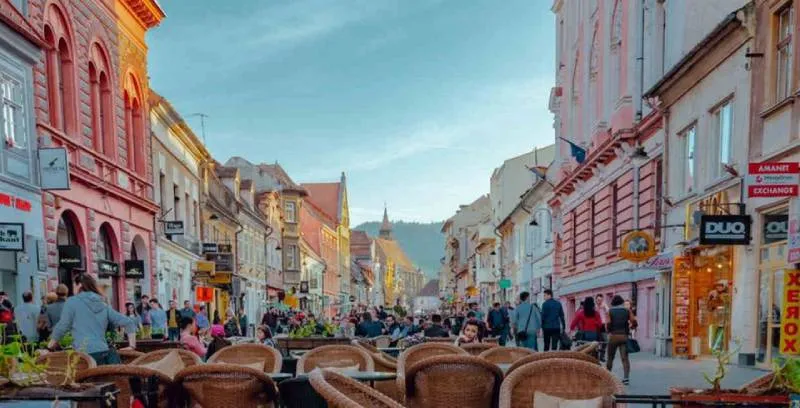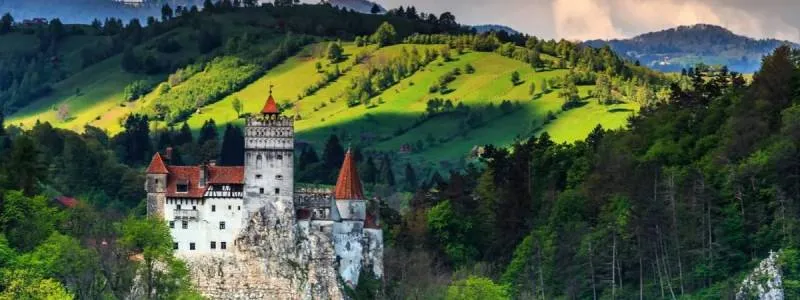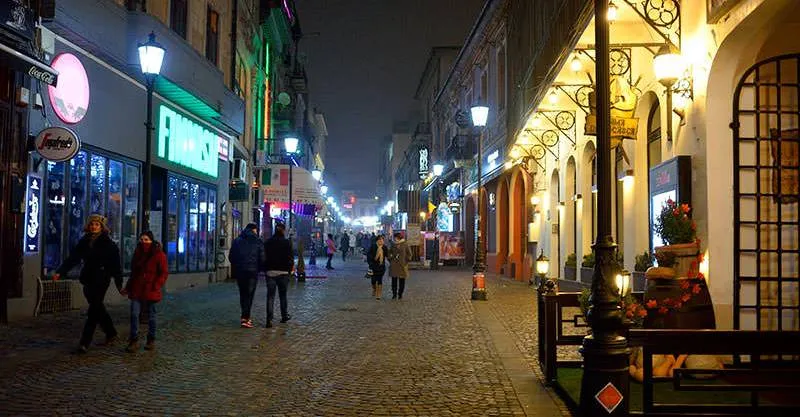email: info(at)go-eu.com
phone: +49 (0)89 90 42 23 60



assisted in a company setup.

Update 2024: 10 minute initial consultation 100% free.
Inquire now
Give us a call: +49 (0)89 90 42 23 60
(*Call at low cost German landline)
TOP 5 reasons: Emigrate to Romania
14 September 2024 9277 6Eastern Europe continues to be very popular because of its opportunities. It wasn't long ago that Romania was still communist – until 1989, to be precise. Ceausescu had plundered his country. Romania was down - a rebound was the only possible direction that is lasting to this day. This is also reflected in the economy: from 2010-2022 Romania was many times the country in the EU with the highest economic growth and always in the TOP 3. This is just one of the reasons why emigrate to Romania makes perfect sense.
Romania is conveniently located in the southeast of Europe. The mild continental climate brings many hours of sunshine, pleasantly mild and long summer months - as well as snowy winters.
But what really defines emigration to Romania? A large number of Romanians are leaving the country for lack of job prospects. That's true though. Only the trend is down! Wages have long since risen, and people leaving their homes almost exclusively affect rural people Gebiete.
Here are even 7 advantages (2 more then in the video) of emigrating to Romania:
1. Lowest taxes in the EU
When it comes to emigrating, the first thing you should think about is the feeling of well-being in your new home country. Ultimately, this will be the new center of life if you dare to move to Romania
There is absolutely no objection to this statement - however, a global perspective is required - since many factors play a role.

One of the most important factors is: How much money do I have to live on at the end of the day! Low taxes are therefore very welcome. When it comes to saving taxes, or to be more precise: “Most of what’s left over after taxes from the own income” Romania often goes under the radar. Therefore, it will surprise one or the other that Romania actually offers the lowest tax for the self-employed, freelancers and entrepreneurs; among all EU countries.
1% up to 1 million EUR turnover per year. 5% dividend tax to distribute the profit of the own company to his private account. In the best case: 6% tax. So if for example 100.000 EUR profit to be paid out, 6% go to the Romanian tax office. 94,000 EUR are exclusively at the free disposal after taxes. This also applies if I do not have a residence in Romania, i.e. if I maintain a Romanian place of business out of DE, AT or CH.
If I am registered in Romania and live there, only an amount for health insurance is added. in addition. In our example, this would be about 500 EUR for the whole year, since this is capped.
2. Low cost of living
Many post-communist countries have caught up quite well in recent decades when it comes to rising living standards. Of course, this was reflected in the inflation rate. Romania is truly not a third world country, or even the poorhouse of Europe. In the metropolises there is almost full employment. Nevertheless, you can live with many amenities significantly cheaper (approx. 50%) than in DE, AT or Switzerland.

If we take Stuttgart as a comparison city compared to Bucharest, various statisticians predict that in 2022 it will be more than "50% cheaper" - and this on average in all areas. Living, residing and eating less than half is still a main argument for us.
3. (Small) business friendly
Romania is one of the most liberal countries in the EU when it comes to small business status. Up to 300,000 Romanian LEI per year, your own company is classified as a small business and you are exempt from sales tax. According to the conversion, this corresponds to approx. 60,000 EUR/year or 5,000 EUR per month - which does not result in a 19% VAT fee on sales. In Germany, the threshold is just EUR 22,500.

It is also completely legal to found several small companies in Romania - for which the exemption from sales tax still applies - per company (which is not permitted in Germany).
No sales tax for quite decent sales - if this is divided between several companies - as well as 1% tax at the end of the year on the annual sales.
This structure has more than convinced us. With this model you can almost keep up with tax havens like the Caymen Islands or the Bahamas.
4. Enchanting nature (mountains, forests, beach and sea)
Rarely are both combined: Huge forests, mountains and long stretches of beach directly on the Black Sea. Outside of the big cities, enjoy pure nature and real freedom. A large part of Romania is shaped by the Carpathians and other mountains and their large forest occurrences.

After a 1.5 hour drive from Bucharest you can reach Constanta and you are already right on the sea.
5. Fast internet
How can a country that didn't even have a democracy until the early 1990s and was communist regularly kick us Germans and all other EU countries in the butt when it comes to internet speed? It turns out that a unique Romanian phenomenon has allowed the Eastern European nation to get one of the fastest internet networks in the world.
There are a few reasons why internet speeds in Romania rival those in Japan, China and Korea and make the rest of Europe and North America seem slow in comparison. For one thing, far fewer people are online in Romania. The persistent internet usage rate in Romania is only 50 percent.

But there are other factors in the history of Romanian telecommunications that have led to the impressive internet speeds.
When the demand for high-speed Internet began to grow in Romania, Romtelecom (Romania's AT&T) had not yet entered the market. To meet the demand, resourceful entrepreneurs began to set up neighborhood networks: Small, localized companies serving a customer base of only a few blocks.
At first, it was just local networks that neighbors could use to share their downloaded music or play games together. Local area network operators began to make more money as more people joined the network. So they decided to use the LANs as a convenient way to sell cheap, high-speed internet to a certain area by installing overhead fiber optic lines.
6. High job opportunities thanks to full employment in the metropolises
The capital Bucharest recorded 13,270 unemployed people (including 6,926 women) at the end of August 2022, bringing the unemployment rate to 1.08%, data from the Bucharest Employment Agency showed Tuesday (September 20, 2022).

In the last quarter of 2022, the Romanian economy surprised on the upside with a real GDP growth rate of 5.4%.
In the first half of the year the economy grew by 5.8% compared to the same period last year. This figure is well above the Romanian government's summer forecast of 3.5% for the whole year of 2022.
Romania produces coal, natural gas, iron ore and petroleum, but most of the raw materials for the country's large industrial capacity potential are imported. The most important branches of industry include the chemical industry (petrochemicals, paints and varnishes), metal processing, mechanical engineering, industrial and transport equipment, the textile industry, the manufacture of consumer goods, the wood industry and the furniture industry.
39.4% of Romanian territory is arable land, 28% forests, 21% pastures, hay meadows and orchards and 2.5% vineyards. Corn, wheat, oilseeds, vegetables, apples and grapes are the most important crops, sheep and pigs are the most important livestock. Forestry and fisheries are developed under long-term programs. Since 1990 successive governments have focused on transforming Romania into a market economy.
7. High security in Romania
There is no travel warning for Romania. Despite what is going on in the world, Romania remains one of the safest countries in Central and Eastern Europe with a crime rate below the European average. According to the Global Peace Index, Romania is a peaceful country with a score of 26/162.

The means of transport in Romania are mostly safe. As in any other country, taxi drivers could take advantage of an unprepared tourist and trick him into paying way too much for the ride. Tourists are advised to use Uber to avoid such incidents.
Although pickpocketing and petty theft are among the most common crimes in Romania, they are mostly found in big cities like Bucharest or other famous tourist destinations in Romania, and even there, they are rare compared to other major European capitals.
While Romania is very safe for female travellers, they should be aware of the dangers of traveling alone in an unfamiliar city. As with almost anything, they should avoid walking alone down empty or poorly lit streets, passing groups of people who are acting or looking strange, or engaging in conversations with unfamiliar people who might seem oddly friendly.
Update 2024: 10 minute initial consultation 100% free.
Inquire now

Oliver Brausch
Published on 02 November, 2022 / Answer
I actually came across you after emigrating to Romania 4 years ago. I can fully confirm most of this. I would be happy to meet at a cafe to exchange ideas. Maybe at Baneasa Mall?
Carl Runfold
Published on 03 November, 2022 / Answer
The cost of living has also risen sharply in Romania. But 50% cheaper than in Germany in most of the cases. In some areas it can even be more expensive, like gyms or some nightclubs.
Sandra Keller
Published on 03 November, 2022 / Answer
If I want to set up a company there now, do I have to emigrate first? And register in Romania..
Thomas Hofmann
Published on 13 December, 2022 / Answer
Founding a company within the EU is a normal process and happens in large a number every day - also in such a way that the center of life and place of residence of the founder is not in the founding country - but in the home country. It is advisable to set up the company before you emigrate. So you are already doing business and can then easily take care of emigration without any pressure.
Jens Br.
Published on 04 November, 2022 / Answer
I am interested in starting a rom. Company . What is the fastest way?
Thomas Hofmann
Published 04 November, 2022 / Answer
We are available by phone daily on weekdays during regular office hours. We are always happy when someone calls directly. An initial conversation incl. consultation is always free of charge.
Josh
Published on 14 September, 2024 / Answer
I want to setup a company in Romania by end of the year and move there.
Post a comment